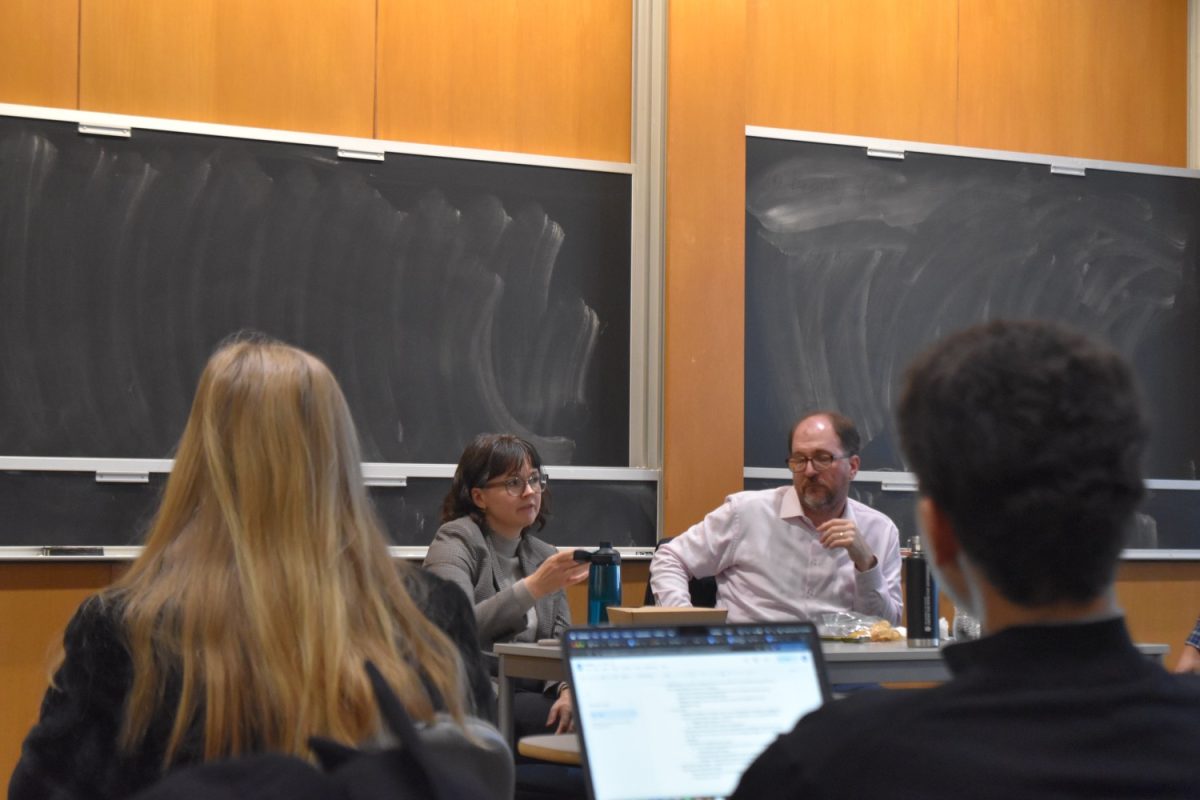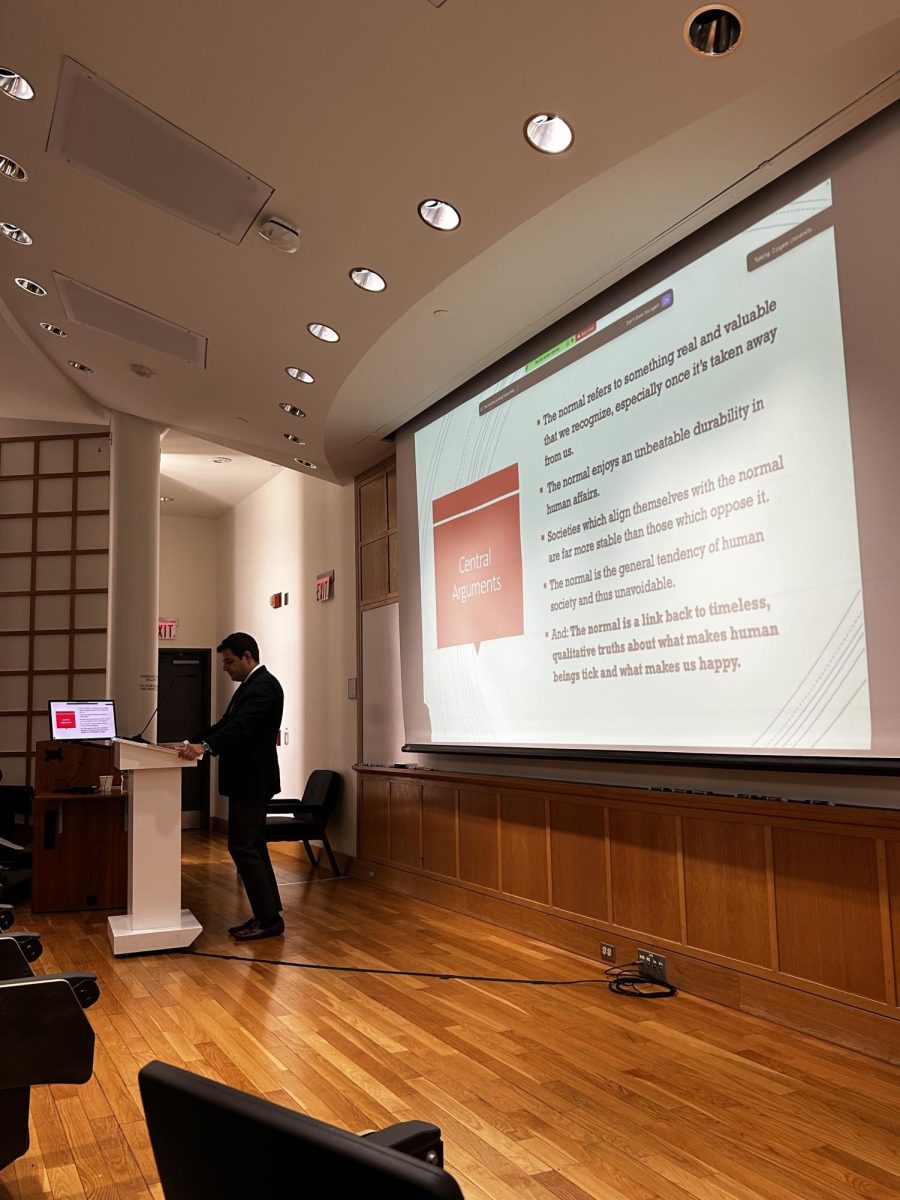Colgate University hosted its next event in the Road to the White House Election Series, titled “Stakes for Governance,” on Monday, Oct. 28. Soren Dayton, director of governance at the Niskanen Center, and Annie Benn, assistant professor of political science, took turns answering questions on the stakes of the election taking place on Nov. 5.
Associate Professor of Political Science and Director of the Public Affairs and Policy Research Initiative Sam Rosenfeld moderated the discussion, explaining what “Stakes for Governance” means. Each potential administration would clearly aim for different policy, but there are also differences in how each potential administration would change administrative processes.
“Elections can also set the stage potentially for changes in how policy making and governing takes place, processes of lawmaking and administration, the balance of power across different institutions and offices,” Rosenfeld said. “Questions like, ‘might power and policymaking grow more concentrated in the executive branch or in the person of the president himself or herself?’ Will the nature of relations between Congress and the presidency change in a noticeable way and for enduring ways?”
Rosenfeld began by asking Benn and Dayton what they thought was the most major long-term change in how government functions they could see potentially taking place in the different administrations. Benn, who has studied the functions of the executive branch in depth and is particularly interested in the bureaucracy in the context of separation of powers, gave an explanation of what exactly the bureaucracy is.
“There’s about two million civilian employees of the federal government and only about 4,000 political appointees. So of this giant governing apparatus we have, it’s primarily professionals who are protected by civil service regulations, which means stuff like you can’t be fired because you disagree with your boss,” Benn said. “You have to have certain professional experience or requirements to be hired in the first place.”
Using the example of the current listeria outbreak, Benn explained that the general public doesn’t hear about or think about the functions of the bureaucracy in their day-to-day lives. People may first think about this issue as a failure of meatpacking inspections, but in reality the bureaucracy plays a large role in protecting the public and fixing these everyday problems, highlighting how crucial the bureaucracy is.
“How little time you spend in your day-to-day life thinking about how the government works is testimony to how effective government is at protecting you from a lot of the harms that would otherwise be part of our modern society,” Benn said. “So having sort of laid that groundwork, it’s critically important that these professional bureaucrats be able to continue to do that work.”
With the upcoming election, Benn explained two threats posed to how the bureaucracy functions depending on which candidate wins the election.
“The first is a threat to civil service capacity. In a Trump administration, that threat looks a lot more stark because the candidate Trump and the previous Trump administration were very outspoken about sort of direct attacks on civil service protections,” Benn said. “[The second is] making being a bureaucrat a less desirable job, which makes it less likely for the types of qualified, policy-motivated people we want in the bureaucracy to take these jobs, and in a Harris administration, the threat is less emergent.”
Dayton focused on what he thought were similarities between the potential administrations rather than the individual candidates, namely the growing power of the executive branch in recent years.
“I think we’ve seen, frankly, in every administration since maybe the Bush era, a desire to get more out of the executive branch then it easily gives up,” Dayton said. “We’ve seen recently, the student loan program, the student debt relief program that Biden had, was an attempt to accomplish a political goal and a policy goal and sort of pushing at the boundaries. I think there’s lots of examples from the Trump administration.”
Dayton then went on to explain a possibly more concerning trend in recent administrations, explaining the term “impoundment,” which is when the President withholds funds appropriated by Congress. Dayton described how the functions of both Congress, traditionally controlling “purse strings,” and the presidency, meant to execute the wills of Congress, are changing. Impoundment was the governance argument for former President Donald Trump’s first impeachment.
“[The executive branch is saying that, we] can spend the money however we want, regardless of what Congress is. And this has been incredibly jarring to all sorts of people in Washington,” Dayton said. “Congress can do one thing: spend money. Everything else is sort of ancillary under debate, but that’s where the height of Congress’ power is, and you’ve got a very clear statement that the people who would likely be in charge and were, in fact, the key people in these roles in the first Trump administration, have a very different point of view and intend to execute it.”
Project 2025, Schedule F and the “Deep State” were important topics in the conversation, and Benn and Dayton wanted to make sure that these were terms known to the audience. The Heritage Foundation, a spearheader of Project 2025, is a conservative think tank founded in the ‘70s.
“Starting in 1980, every four years, the Heritage Foundation has produced a report called ‘Mandate for Leadership,’ and in 1980 they gave it to the incoming Reagan administration […] Ever since then, every four years, there has been a similar product,” Dayton said. “So project 2025 is the 2024 version of that document, plus a recruiting program for potential staff, plus a sort of coalition effort […] The sort of opening chapters are written by people who serve directly adjacent to President Trump. And interestingly, I don’t think any of the people in that first section actually worked for Heritage, but I have always viewed it primarily as a way of getting the conservative movement on a similar page.”
Benn explained what has become known as the “Deep State” in relation to Schedule F, an executive order under Trump that never went into effect before he lost reelection.
“The ‘Deep State’ is the idea that bureaucrats, sort of systematically and in an organized way, are resisting the instructions they’re getting there from their political leadership that like the President and Congress, are elected by the people. […] That isn’t true,” Benn said. “You don’t always get perfect responsiveness when you ask civil servants to do something. You might get something different than what you asked for. The reasons for that are much more complicated.”
Schedule F would have gotten rid of certain protections for civil servants. Benn explained some of the consequences of Schedule F potentially being enacted.
“One of the big effects of Schedule F would be to dramatically shift control over the bureaucracy from Congress to the President,” Benn said. “It is troubling because what it means is that a bureaucrat being asked by Congress to do something that’s inconsistent with presidential preferences, if they do what Congress asks them to do, they can be fired for failing to do what the President asked them to do.”
After more discussion on recent changing trends in the executive branch and Congress, including landmark Supreme Court cases, Rosenfeld opened up to a Q&A.
Senior Natalie Schonfeld attended the talk and shared her outlook on the upcoming election.
“I really loved the conversation and was appreciative of the insight given about governance,” Schonfeld said. “I am nervous for the upcoming election, but having this speaker series helps to give me more knowledge about the whole process. I hope it also is helping others.”

















